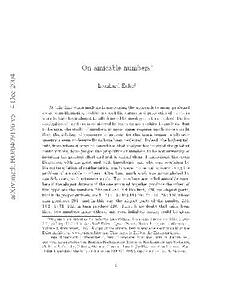
On amicable numbers PDF
Preview On amicable numbers
On amicable numbers∗ 4 0 0 Leonhard Euler† 2 c e D 4 At this time when analysis is uncovering the approach to many profound areas in mathematics, problems about the nature and properties of numbers 5 seem to have been almost totally ignored by most geometers. Indeed, the in- v vestigation ofnumbers isconsidered by many toaddnothing toanalysis. But 6 9 to be sure, the study of numbers in many cases requires much more insight 1 than the subtlest of geometric questions; for this same reason, arithmetic 9 0 questions seem undeservedly to have been neglected. Indeed, the highest tal- 4 ents, fromwhom it must beconsidered that analysis has received thegreatest 0 / contributions, have judged the properties of numbers to be not unworthy of O investing the greatest effort and zeal to unfold them. I understand that even H Descartes, with his great and wide knowledge, and who was overtaken by . h the contemplation of mathematics, was however not equal to overcoming the t a problem of amicable numbers. After him, much work was accomplished by m van Schooten, with extensive study. Two numbers are called amicable num- : v bers if the aliquot divisors of the one summed together produce the other; of i X this type are the numbers 220 and 284. Of the first, 220, its aliquot parts, r thatisitsproperdivisors, are1+2+4+5+10+11+20+22+44+55+110,whose a sum produces 284: and in this way the aliquot parts of the number 284, 1+2+4+71+142, in turn produce 220. There is no doubt that aside from these two numbers many others, and even infinitely many, could be given ∗Originally published as De numeris amicabilibus, Nova acta eruditorum (1747), 267- 269, and republished in Leonhard Euler, Opera Omnia, Series 1: Opera mathematica, Volume 2, Birkh¨auser, 1992. A copy of the original text is available electronically at the Euler Archive, at www.eulerarchive.org. This paper is E100 in the Enestr¨om index. †Date of translation: December 4, 2004. Translated from the Latin by Jordan Bell, 2nd year undergraduate in Honours Mathematics, School of Mathematics and Statistics, Carleton University, Ottawa, Ontario, Canada. Email: [email protected]. Part of this translation was written during an NSERC USRA supervised by Dr. B. Stevens. 1 which have this same property; however, neither Descartes or after him van Schooten were able to find more than three of these pairs of numbers, and they were not equal to this study although they are seen to have been very devoted to tackling this. There is a method which can be used to generate both numbers in a pair of amicable numbers, so that without much work amicable numbers are able to be found. For this, the numbers are formed by the formulas 2nxy and 2nz, where x, y and z denote prime numbers; it is also required for them to be set such that z = xy + x + y is prime, and also such that 2n(x + y + 2) = xy + x + y + 1. Therefore for each of the successive different values that the exponents n take, prime numbers x and y are searched for such that xy+x+y makes a prime number, and then the formulas 2nxy and 2nz produce amicable numbers. It is easily seen that as the exponents procede to larger n, soon the numbers xy + x + y will have reached such a size that it will be impossible to discern whether or not they are both prime, with the table of prime numbers not having been extended beyond 100000. Clearly we should not lightly put aside the question of whether all the amicable numbers can be assumed to be included in these formulas. I have carefully assessed this, and not calling on any tricks, but only using the nature of division, I have obtained many other pairs of amicable numbers, of which I relate 30 notable pairs here; so that their origin and nature would be clearly seen, I express them through their factors. Thus, these amicable numbers are: 2 I. 22 ·5·11 & 22 ·71 II. 24 ·23·47 & 24 ·1151 III. 27 ·191·383 & 27 ·73727 IV. 22 ·23·5·137 & 22 ·23·827 V. 32 ·5·13·11·19 & 32 ·5·13·239 VI. 32 ·7·13·5·17 & 32 ·7·13·107 VII. 32 ·72 ·13·5·41 & 32 ·72 ·13·251 VIII. 22 ·5·131 & 22 ·17·43 IX. 22 ·5·251 & 22 ·13·107 X. 23 ·17·79 & 23 ·23·59 XI. 24 ·23·1367 & 24 ·53·607 XII. 24 ·17·10303 & 24 ·167·1103 XIII.a 24 ·19·8563 & 24 ·83·2039 XIV. 24 ·17·5119 & 24 ·239·383 XV. 25 ·59·1103 & 25 ·79·827 XVI. 25 ·37·12671 & 25 ·227·2111 XVII. 25 ·53·10559 & 25 ·79·7127 XVIII. 26 ·79·11087 & 26 ·383·2309 XIX. 22 ·11·17·263 & 22 ·11·43·107 XX. 33 ·5·7·71 & 33 ·5·17·31 XXI. 32 ·5·13·29·79 & 32 ·5·13·11·199 XXII. 32 ·5·13·19·47 & 32 ·5·13·29·31 XXIII. 32·5·13·19·37·1583 & 32·5·13·19·227·263 XXIV. 33 ·5·31·89 & 33 ·5·7·11·29 XXV. 2·5·7·60659 & 2·5·23·29·673 XXVI. 23 ·31·11807 & 23 ·11·163·191 XXVII. 32·7·13·23·79·1103 & 32·7·13·23·11·19·367 XXVIII. 23 ·47·2609 & 23 ·11·59·173 XXIX. 33 ·5·23·79·1103 & 33 ·5·23·11·19·367 XXX. 32 ·52 ·11·59·179 & 32 ·52 ·17·19·359 a Translator: This is not an amicable pair. Ferdinand Rudio, the editor of this paper for the Opera Omnia, notes that this was observed by K. Hunrath in 1909/10. 3
